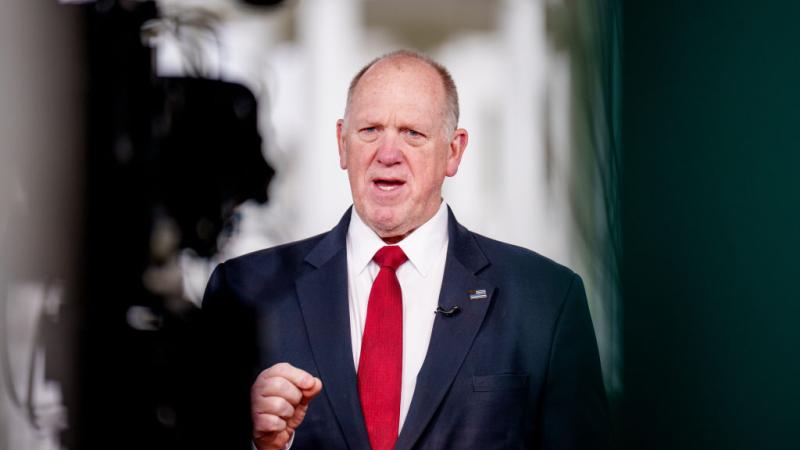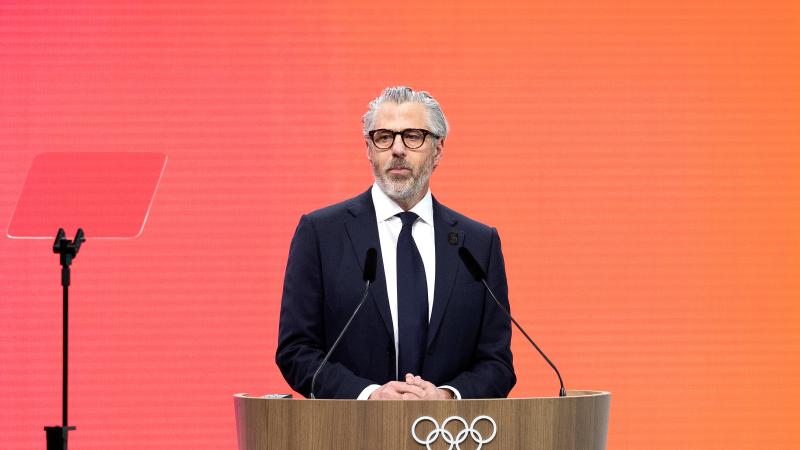Nearly one-third of detainees released from Gitmo may have returned to terrorism, ODNI data shows
Guantánamo Bay's island detention center in Cuba has seen hundreds of detainees pass through its gate since 9/11. New data suggests roughly one-third of those held may be returning to terrorism after they were freed.
Close to one-third of the hundreds of detainees released from detention at Guantánamo Bay since the terrorist attacks of 9/11 are either confirmed to have returned to terrorism or are suspected of having done so, according to new data released by the Office of the Director of National Intelligence.
ODNI revealed in a declassified report late last month that 739 suspected terrorists have been released from Guantánamo Bay after the Cuban island base began to be used as a detention facility in the wake of 9/11. Of those, ODNI assessed that 137 of the detainees who were let go are “confirmed of reengaging” in terrorist-related activities, with the Defense Intelligence Agency putting the number at 140 of the detainees.
This means the U.S. intelligence community believes that 18.5% (or, alternatively, 18.9%) of the former detainees held at Gitmo have rejoined terrorism in some form or fashion. Of those confirmed to have rejoined terrorism, 39 are now deceased, 23 are now in foreign custody, and 75 remain at large.
Additionally, ODNI assessed that another 97 former Gitmo detainees are “suspected of reengaging” in terrorism, while the DIA put the number at 95 former detainees, meaning something close to 13% of former detainees are suspected of rejoining terrorist activities since being let go. Of this group, five are deceased, twelve are now in foreign custody, and 80 remain on the run.
All told, more than 30% of former detainees previously held at Gitmo are either confirmed to have rejoined or suspected of rejoining terrorist activity.
“Transfers to countries with ongoing conflicts and internal instability as well as recruitment by terrorist or insurgent organizations could pose an increased risk of reengagement,” ODNI’s declassified report assessed. “While enforcement of transfer conditions probably has deterred many former detainees from reengagement, some detainees determined to reengage have and will do so regardless of any transfer conditions, albeit at a lower rate than if they were transferred without conditions.”
Communications range from mundane to nefarious
The ODNI stated that “former GTMO detainees routinely communicate with each other, families of other former detainees, and members of terrorist organizations” and that “the reasons for communication span from the mundane (reminiscing about shared experiences) to the nefarious (planning terrorist operations).”
“We assess that some GTMO detainees to be transferred in the future probably would communicate with other former GTMO detainees and persons in terrorist organizations. We do not consider mere communication with individuals or organizations—including other former GTMO detainees—an indicator of reengagement,” ODNI said. “Rather, the motives, intentions, and purposes of each communication are taken into account when assessing whether the individual has reengaged.”
The new report, released by Director of National Intelligence Tulsi Gabbard in consultation with the CIA and the Defense Department, stated that “based on trends identified during the past 20 years, we assess that some detainees currently at GTMO will seek to reengage in terrorist or insurgent activities after they are transferred.”
The Guantánamo Docket, a project of The New York Times, states that an estimated 15 detainees — including the alleged mastermind of 9/11 — remain at Gitmo out of the roughly 780 suspected terrorists who passed through the island detention center since 2002.
“The Bush administration transferred about 540, mostly to the custody of their home countries. The Obama administration arranged for the repatriation or resettlement of about 200 men in nations around the world. The Trump administration transferred one man to a prison in Saudi Arabia, and the Biden administration has repatriated 13, transferred 11 to Oman and freed one, reducing the total inmate population to 15 men today,” the Times' report says.
It remains unclear if the alleged masterminds of the 9/11 attack — Khalid Sheikh Mohammed and others — will ever face a death penalty trial at Guantánamo Bay, in part due to the challenged admissibility of their confessions to the FBI following their treatment while in CIA custody, as well as due to actions taken by the Defense Department under Secretary Lloyd Austin in which he exceeded his authority by withdrawing from a plea deal offered to the defendants.
Infamous inmates yet to stand trial
Mohammed, dubbed “KSM” and described as “the principal architect of the 9/11 attacks” in the 9/11 Commission Report, was a close ally of Osama bin Laden and is being tried in a death penalty case which involves four other Gitmo defendants: his nephew, Ammar Baluchi, who allegedly sent money transfers to hijackers inside the U.S.; alleged hijacking trainer Walid bin Attash; alleged 9/11 facilitator Ramzi bin Shibh; and alleged al-Qaeda money man Mustafa Hawsawi.
In the nearly two and a half decades since 19 al-Qaeda terrorists crashed hijacked planes into the World Trade Center buildings, the Pentagon, and a field near Shanksville in Pennsylvania, killing nearly 3,000 people, the five men believed to be responsible for the planning and execution of the plot have yet to stand trial. The key question of whether confessions obtained by the FBI after their CIA custody should be admissible remains unresolved.
The defense teams are seeking to throw out confessions that the five men made to FBI “clean teams” at Guantánamo Bay after they had been subjected to “enhanced interrogation techniques” — considered torture by some — at CIA black sites. KSM confessed to planning the 9/11 attacks in a March 2007 statement to the Combatant Status Review Tribunal, saying, “I was responsible for the 9/11 operation, from A to Z."
The 9/11 cases at Guantánamo Bay have been delayed many times following unfavorable Supreme Court decisions under President George W. Bush and an abandoned effort by President Barack Obama to try the men in a New York City federal court.
Shutting down Gitmo
President Donald Trump in his first term, vowed to keep the prison open while President Joe Biden unsuccessfully sought to close entirely the detainee operations there. Then-White House Press Secretary Jen Psaki repeated in December 2021 that Biden “absolutely remains committed to shutting down Guantánamo Bay.”
Republicans battled against Biden’s efforts to shutter Guantánamo Bay, including placing provisions in the annual National Defense Authorization Act, including barriers to using U.S. taxpayer and Pentagon funds to transfer the detainees to certain foreign countries, a ban on using such taxpayer funds to construct or modify facilities inside the U.S. to house them, (including the men charged with responsibility for 9/11), and forbidding the relinquishing of U.S. control over Guantánamo Bay. Guantánamo is the easternmost province of Cuba. Its capital is also called Guantánamo.
Biden issued a signing statement criticizing the provisions even as he signed the NDAA into law, arguing that “it is the longstanding position of the executive branch that these provisions unduly impair the ability of the executive branch to determine when and where to prosecute Guantánamo Bay detainees and where to send them upon release.”
Republicans have repeatedly and harshly criticized any deal with the 9/11 defendants which would have taken the death penalty off the table as the Biden administration spent years attempting to reach such a plea deal with the terrorists.
The House Armed Services Committee’s Republicans said at the time that “the Biden administration is doing the unthinkable – they are considering offering the terrorists who organized those attacks, plea deals to escape the death penalty” and that “these terrorists killed thousands of innocent people – they deserve the death penalty.”
Susan Escallier, who was then the Convening Authority for the Military Commissions, agreed to a plea deal with KSM, Bin Attash, and Hawsawi last summer which would have taken the death penalty off the table in exchange for them taking responsibility for their roles in 9/11.
Plea deals on-again, off-again
The Office of the Chief Prosecutor and the Director of the Office of Military Commissions Victim Witness Assistance Program sent a late July 2024 letter to 9/11 victim families alerting them of the deal.
“Khalid Shaikh Mohammad, Walid Bin ‘Attash, and Mustafa al Hawsawi entered into pre-trial agreements in this case with the Convening Authority. In exchange for the removal of the death penalty as a possible punishment, these three Accused have agreed to plead guilty to all of the charged offenses, including the murder of the 2,976 people listed in the charge sheet, and to be later sentenced by a panel of military officers,” the letter said. “As part of the pre-trial agreement, the Accused have also agreed to a process to respond to questions submitted by VFMs regarding their roles and reasons for conducting the September 11 attacks, should you have any unanswered questions about the attacks you would like answered.”
Then-Defense Secretary Lloyd Austin sought to shred the plea deals in early August 2024. Air Force Colonel Matthew McCall, a military judge handling the 9/11 case, ruled in November 2024 that Austin was not able to withdraw the plea deal which had been offered to the terrorists and agreed to by them. The judge ordered the plea deal proceedings to move forward.
Hegseth: "He deserves the death penalty"
Defense Secretary Pete Hegseth visited Guantánamo Bay in February, where he said that he had seen the 9/11 defendants. “I saw them all… I saw Khalid Sheikh Mohammed … I hope he finds justice soon,” Hegseth told Fox News. “And it’s one of the rare things that I agree with my predecessor, Lloyd Austin, that he deserves the death penalty. And I hope he finds it soon through that system.”
The Pentagon, through the Justice Department, appealed McCall's ruling, and first received a stay on the plea deals early this year. The U.S. Court of Appeals for the District of Columbia then sided with the Pentagon in a 2-1 ruling.
The appeals court vacated the military judge’s order, which had prevented Austin and then Hegseth from withdrawing from the plea deal, and the court prohibited the military judge from conducting hearings where the guilty pleas would be allowed to be entered.
Majority of released detainees head to Afghanistan
When it comes to the detainees who were released from Gitmo, the Guantánamo Docket says that the top destination country for releases was Afghanistan, where 204 detainees were previously transferred. The Taliban took over Afghanistan in 2021. 142 detainees have also been transferred to Saudi Arabia, 66 transferred to Pakistan, 41 to Oman, 24 to the UAE, 22 to Yemen, and smaller numbers to other countries.
Among those detainees released during the Obama administration were five high-ranking Taliban members who were part of a 2014 prisoner swap that secured the release of former Army soldier and deserter Bowe Bergdahl. After Bergdahl pleaded guilty to desertion and to endangering the American troops sent to search for him, his rank was demoted to private and given a dishonorable discharge. Bergdahl was not sentenced to prison.
Trump said of the prisoner swap at a 2015 campaign rally, “So we get Bergdahl, a traitor, and they get five of the people that they most wanted anywhere in the world, five killers that are right now back on the battlefield doing the job.”
All five of the so-called “Taliban Five” were named to key roles in the Taliban’s ruling government after the group took over in August 2021, according to the Middle East Institute’s Taliban Leadership Tracker.
Abdul Haq Wasiq is now the Taliban’s director of the General Directorate of Intelligence, Mullah Khairullah Khairkhwa is the Taliban’s minister of information and culture, Mullah Noorullah Noori is the Taliban’s minister of borders and tribal affairs, Mohammad Fazal Akhund is the Taliban’s first deputy minister of national defense, and Mohammad Nabi Omari is the Taliban’s first deputy minister for security affairs.
The Facts Inside Our Reporter's Notebook
Links
- new data
- declassified report
- assessed
- assessed
- stated
- said
- released
- states
- says
- says
- Khalid Sheikh Mohammed
- befuddling actions
- described
- confessed
- statement
- charging sheet.
- asked
- repeated
- battled against
- shutter
- signing statement
- harshly criticized
- tweeted
- said
- fired
- report
- letter
- said
- sought to shred
- letter
- ruled
- said
- told
- sided
- vacated
- says
- claimed
- said
- shot in the head
- died
- said
- five
- named
- key roles
- Taliban Leadership Tracker
- Abdul Haq Wasiq
- Mullah Khairullah Khairkhwa
- Mullah Noorullah Noori
- Mohammad Fazal Akhund
- Mohammad Nabi Omari















